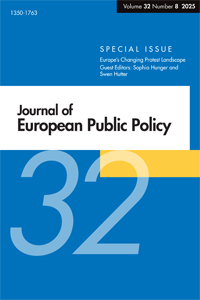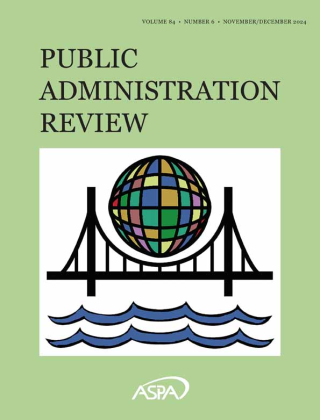-
9 Jul 2025 • Journal Article • Journal of European Public Policy
At the last minute: the use of the prime minister's power to amend the agenda during a crisis
AbstractCoalition management is challenging, especially during the agenda-setting stage. The prime minister has to balance the priorities of the coalition partners, ministers from her party, and broader government priorities. To meet this challenge, the prime minister has agenda-setting power. Most research has studied the agenda-setting power during periods of stability. This
… show more -
26 Jun 2025 • Journal Article • Perspectives on Politics
Career Civil Servants’ Socially Embedded Responses to Democratic Backsliding
AbstractRecent studies portray civil servants as potential guardians against populist attempts to undermine liberal democracy. However in polarized societies, bureaucrats, like citizens, tend to hold divergent perceptions of the threat that politicians’ actions pose to democracy. This, in turn, likely shapes bureaucrats’ responses. We examine this in the context of the attempt
… show more -
30 Jan 2025 • Journal Article • Journal of Public Administration Research and Theory
Does enforcement style influence citizen trust in regulatory agencies? An experiment in six countries
AbstractEstablishing and maintaining citizen trust is vital for the effectiveness and long-term viability of regulatory agencies. However, limited empirical research has been conducted on the relationship between regulatory action and citizen trust. This article addresses this gap by investigating the influence of various regulatory enforcement styles on citizen trust. We
… show more -
2025 • Journal Article • Public Administration Review
A taste for government employment also rests on its political flavor
AbstractThe global experience of political polarization, and politicians' attacks on democratic institutions, render individuals' identification with the governing coalition, or with its opposition, a likely antecedent of their attraction to work in government. This article examines to what extent individuals' partisan alignment with the governing coalition, and perceptions of
… show more -
16 Nov 2024 • Preprint • Social Science Research Network
The Role of Exogenous Macro Shocks in Shaping the Appeal of Government Employment
AbstractThis article examines whether and how an exogenous crisis affects citizens' attraction to government employment. Employing a panel survey with Israeli respondents, before and after Hamas' October 7 attack, we examine the change in their sector preferences and its association with trust in government, PSM, and partisanship. We find a moderate increase in respondents'
… show more -
24 Jul 2024 • Journal Article • International Public Management Journal
The design of opportunities for civil servants’ inter-departmental networking behavior
AbstractExtant research has identified individual, organizational, and environmental level attributes that shape the variation in public managers’ external networking behavior. It theorized that public managers’ networking behavior is instrumentally motivated by resource deficiencies. We postulate that beyond motivation, managers’ and civil servants’ networking behavior is
… show more -
4 May 2024 • Journal Article • Perspectives on Public Management and Governance
Citizens’ Communication Styles in Written Public Encounters
AbstractCurrent studies of citizens’ coping behaviors in public encounters lack a direct examination of what citizens say and how they say it. Moreover, despite the ubiquity of citizens’ written communications with the state, such interactions are seldom studied. This article contributes a relational approach to studies of citizens’ coping behaviors by developing a taxonomy
… show more -
17 Feb 2024 • Journal Article • SocArXiv
Partisan Alignment and the Propensity to Choose a Job in a Government Ministry
AbstractThe global experience of political polarization, and politicians’ attacks on democratic institutions, render individuals’ identification with the governing coalition, or with its opposition, a likely antecedent of their attraction to work for government organizations. This article examines to what extent individuals’ partisan alignmentwith the governing coalition, and
… show more -
4 Jan 2024 • Preprint • Social Science Research Network
Civil Servants’ Divergent Perceptions of Democratic Backsliding and Intended Exit, Voice and Work
AbstractRecent studies analyse bureaucrats’ responses to politicians’ engagement in unprincipled and illiberal policies, which are integral to democratic backsliding. Yet, in polarized societies, bureaucrats, due to their dual identities as government professionals and as citizens, are likely to hold divergent perceptions of the threat that politicians’ policies and actions
… show more -
25 Jun 2023 • Journal Article • Public Management Review
Civil servants’ inter-departmental social ties as an impetus for voicing ideas for improvement
AbstractThis article examines whether, why and how inter-departmental networking behaviour enhances employees’ voice behaviour. Current literature suggests that employees’ willingness to voice ideas for improvement is contingent on managers creating an empowering and safe environment, yet external networking can also play a role by broadening employees’ horizons, alerting them
… show more
















